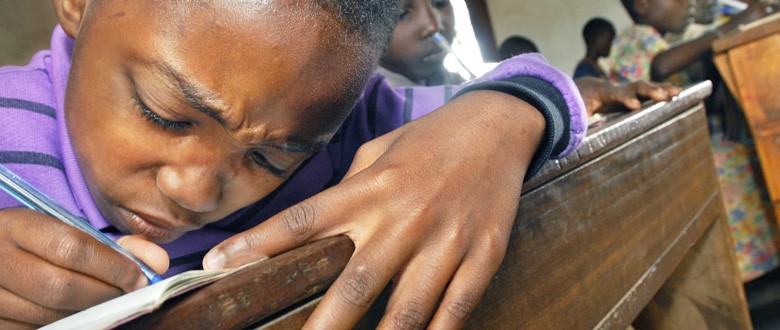
The policy-makers and citizens of Rwanda are intent on getting their country off the list of least developed countries world-wide, as soon as possible. The country’s ambitions are phenomenal. Many plans are being made and a lot of hard work is being carried out. The sustained efforts of the past few years seem to be garnering their first, promising results.
English as the language of instruction
The field of education too has seen some fundamental changes in 2008. The government has taken important strategic decisions which will be put to practice from 2009 onwards. One of the most striking measures was the decision to establish English as the language of instruction. In the next couple of years, the language of Shakespeare (and Madonna) is to become the language of instruction from the first school year onwards. With this decision, policy-makers hope to establish closer contacts with the primarily English-speaking East African Community.
Great ambition
Other policies which were furthered by the Ministry of Education in 2008, are: an ambitious plan to have classrooms built, the integration of ICT in education, the improvement of curricula, the distribution of schoolbooks, the training of school managers, the reform of the teacher training programme, and the fine-tuning of the decentralized system of financing, which basically means that every school receives around 10 euro per pupil.
Nine Year Basic Education
However, without a doubt the most important change in the field of education was the introduction of the Nine Year Basic Education (9YBE) concept. In order to achieve the millennium development goal on universal primary education, the ministry is having the field of education dramatically reformed. The idea is to make primary school free for all children. Unlike the Flemish system, the primary school system of Rwanda comprises nine years. This period is comparable to our combined six school years in primary and the first three years of secondary school (called ‘tronc commun’ in Rwanda).
By stretching primary education over a period of nine years, authorities want to instil so-called ‘life-skills’ in the children. These are practical skills, directly applicable in everyday life (arithmetic, writing, foreign languages, but -to a certain extent- also technical insight, good citizenship, general hygiene, etc.). Having taken 9YBE, pupils graduate ‘well-equipped’ to either set out their lives or to continue to post basic education or vocational training.’
Reform of Technical and Vocational Education and Training (TVET)
Finally, in 2008, the reform of, on the one hand, technical and professional (secondary) education, and, on the other hand, advanced vocational training, was instigated. Learning methods, learning objectives, even the use of infrastructure and facilities in both fields are integrated in a sole national strategy for technical education and vocational training. Ties are created between primary education, technical secondary education, advanced vocational training, professional training for adults and continuing education, making it possible to move from one level onto the next.
School management training
In this context, it is not always easy for VVOB and other international agents to operate. The reforms are not always easy to understand and they are sometimes implemented too swiftly on top of each other. Occasionally, information to clarify important measures is lacking. Especially the continuous adjustment to the shifting context poses a great challenge.
However, in 2008, VVOB has again managed to remain well-positioned to carry out the priorities of policy, set out by the Ministry of Education. The ministry mandates us with the training of all secondary schools in school management. In over 700 schools, VVOB and our Rwandan partners are training headmasters, school prefects, pedagogic officials and bursars and secretary-based employers.
Expansion of advanced vocational training policy
Together with our colleagues from the Belgian Technical Cooperation (BTC) - the bilateral Belgian development co-operation - we are working hard at the expansion of policies corcerning advanced vocational training. With their joint intervention, VVOB and BTC are actively contributing to policy-prospecting work at a national level (at meetings, but also by financing a number of strategic studies) as well as to the further expansion of the public vocational training centre in the southern province. Technical/professional (secondary) education and advanced technical/vocational training are both very much in development in 2008. That is why we should regularly stop to look back and temporize. All in all, the balance is positive. A new national Workforce Development Agency was founded in the second half of the year. In the mean time, the government is promoting the public vocational training centre in the south, which has attained the status of a regional training centre. In the future, all training initiatives in the south are expected to be instigated and coordinated from there.
Closing projects
2008 is also the year in which a chapter was concluded: the chapter concerning curriculum development for secretarial studies and accountancy. From 2009 onwards, VVOB will focus on the further development of training programmes in the field of tourism.
Together with the Kigali Health Institute, we are organising a skillslab in the departments of nursing and obstetrics. At a skillslab, active learning methods are introduced in the health training programmes. We do this by, for example, organising practical lessons with adjusted didactic tools. Together, we are preparing the transfer of these practices to other paramedic training programmes.




